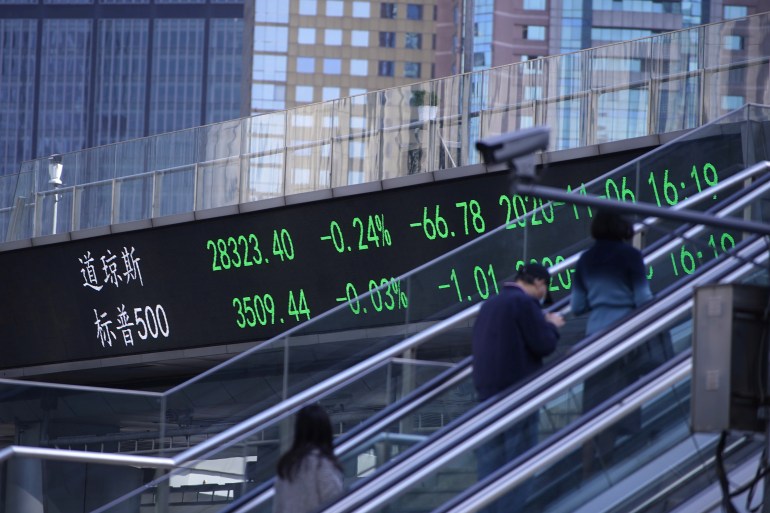Shares jump on hopes of more US stimulus after Biden election win
Investors are betting that a Republican-controlled US Senate will ensure business regulations will remain light.

Stocks surged, oil prices jumped and the United States dollar stayed weak on Monday as investors bet that US President-elect Joe Biden will not be able to push through tougher business regulations in a divided Congress.
Analysts say Biden’s victory in last week’s presidential election – while still being contested in several states – also bodes well for the passage of a fiscal stimulus programme.
Keep reading
list of 4 itemsUS stocks hit pause on post-election rally but gain for week
Hopes of divided US legislature drive stocks higher
Health stocks gain amid ongoing US election uncertainty
E-mini futures for the US S&P 500 share index jumped more than 1.5 percent in Asian trading on Monday while Nasdaq futures rallied more than 2 percent, signalling a positive start for US markets.
MSCI’s broadest index of Asia Pacific shares outside of Japan jumped 1.3 percent to 613.95 points, the highest since January 2018. It had climbed 6.2 percent last week to clock its best weekly performance since early June.
![MSCI All-Country World Index chart [Bloomberg]](/wp-content/uploads/2020/11/365875325.jpg?w=770&resize=770%2C433)
“Biden’s presidency may bring a fresh chapter to US foreign policy, which is important to the world and of particular interest to the export-oriented economies namely China, Mexico, the EU and Japan,” Margaret Yang, a strategist at trading firm IG, said in a research note sent to Al Jazeera.
“The tariff-led trade negotiations and retaliations may be replaced by a more diplomatic and strategic approach to deal with US trade deficits,” Yang wrote.
Lower for longer
Analysts said Biden’s victory probably means already low interest rates will stay that way for the foreseeable future, something that is seen as being good for corporate profits and supportive of share prices.
“While lots of attention was given to Trump vs Biden, markets have reacted strongly to the (likely) split Congress, which means more confidence that interest rates will be lower for longer,” said Dave Wang, portfolio manager at Nuveen Capital in Singapore.
“The best opportunities now lie within segments of emerging markets, in particular China and North Asia. I believe earnings momentum and valuation put China in a very attractive risk/reward position.”
Chinese shares started higher with the blue-chip CSI 300 index up 1 percent on hopes of better China-US trade relations under Biden.
Japan’s Nikkei 225 index rose 2 percent while the main share indices in Australia, Hong Kong and South Korea gained 1.7 percent each.
Equities rallied strongly last week, with the S&P 500 up 7.3 percent, clocking the best gains in an election week since 1932, according to National Australia Bank analyst Tapas Strickland.
But some analysts say that even if Biden manages to push through a fiscal stimulus package, the rise of coronavirus cases in the US is likely to keep the world’s biggest economy under pressure.

“There is some good news in terms of growth … the likelihood of a fiscal stimulus package, perhaps of the order of $1 trillion in 2021 – equivalent to about 5 percent of US gross domestic product. And that will be encouraging for Asia’s exporters,” Robert Carnell, regional head of research at Dutch bank ING, said in a note sent to Al Jazeera.
“But this optimism is tempered by realism about the pandemic, with case numbers above 125,000 for the past three days and the daily death rate in excess of 1,000, the possibility of a reversion back to European-style lockdowns and double-dip recession can’t be ruled out,” Carnell said.
Oil prices also jumped on Monday as investors cheered Biden’s victory, shrugging off worries about lacklustre demand amid rising global coronavirus cases.
Brent crude added $1 to $40.48 per barrel.
Dollar down
A fiscal stimulus plan is still possible despite a divided government, analysts said, though a larger package is less likely. That puts the spotlight on the US Federal Reserve to do more to bolster the world’s largest economy through monetary means.
As a result, the dollar has weakened in recent days while other assets such as the Australian dollar have rallied with the Biden presidency seen less likely to be confrontational with rivals such as China on global trade.
The Australian dollar was up 0.2 percent, having jumped 3.3 percent last week.
The US dollar was mostly flat against the Japanese yen at 103.31, after slipping about 1.3 percent last week.
Investor focus will also be on the British pound and the euro this week with UK-EU trade negotiations ahead of the EU summit on November 15.
Sterling rose to $1.3183, and the euro, which climbed 1.9 percent last week, was a shade higher on Monday at $1.1887.